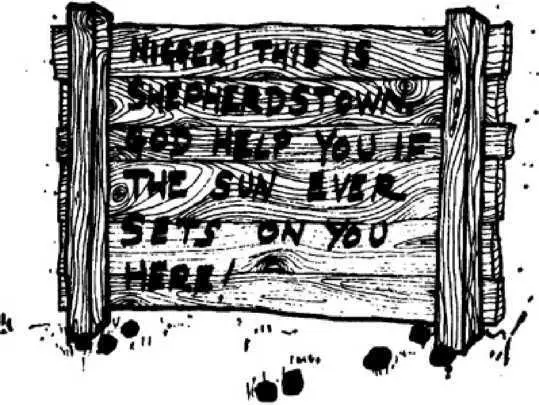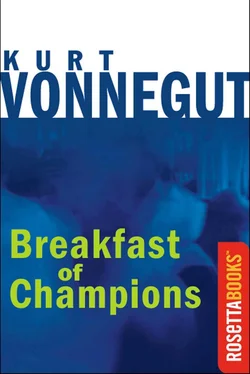Kurt Vonnegut - Breakfast of Champions
Здесь есть возможность читать онлайн «Kurt Vonnegut - Breakfast of Champions» весь текст электронной книги совершенно бесплатно (целиком полную версию без сокращений). В некоторых случаях можно слушать аудио, скачать через торрент в формате fb2 и присутствует краткое содержание. Жанр: Современная проза, на английском языке. Описание произведения, (предисловие) а так же отзывы посетителей доступны на портале библиотеки ЛибКат.
- Название:Breakfast of Champions
- Автор:
- Жанр:
- Год:неизвестен
- ISBN:нет данных
- Рейтинг книги:4 / 5. Голосов: 1
-
Избранное:Добавить в избранное
- Отзывы:
-
Ваша оценка:
- 80
- 1
- 2
- 3
- 4
- 5
Breakfast of Champions: краткое содержание, описание и аннотация
Предлагаем к чтению аннотацию, описание, краткое содержание или предисловие (зависит от того, что написал сам автор книги «Breakfast of Champions»). Если вы не нашли необходимую информацию о книге — напишите в комментариях, мы постараемся отыскать её.
Breakfast of Champions — читать онлайн бесплатно полную книгу (весь текст) целиком
Ниже представлен текст книги, разбитый по страницам. Система сохранения места последней прочитанной страницы, позволяет с удобством читать онлайн бесплатно книгу «Breakfast of Champions», без необходимости каждый раз заново искать на чём Вы остановились. Поставьте закладку, и сможете в любой момент перейти на страницу, на которой закончили чтение.
Интервал:
Закладка:
Dwayne Hoover was still mentally absent from activities in the cocktail lounge. He sat like a lump of nose putty, staring at something long ago and far away.
Dwayne moved his lips as Trout sat down. He was saying this soundlessly, and it had nothing to do with Trout or me: “Goodbye,
Blue Monday.”
Trout had a fat manila envelope with him. Milo Maritimo had given it to him. It contained a program for the Festival of the Arts, a letter of welcome to Trout from Fred T. Barry, the Chairman of the Festival, a timetable of events during the coming week—and some other things.
Trout also carried a copy of his novel Now It Can Be Told. This was the wide-open beaver book which Dwayne Hoover would soon take so seriously.
So there the three of us were. Dwayne and Trout and I could have been included in an equilateral triangle about twelve feet on a side.
As three unwavering bands of light, we were simple and separate and beautiful. As machines, we were flabby bags of ancient plumbing and wiring, of rusty hinges and feeble springs. And our interrelationships were Byzantine.
After all, I had created both Dwayne and Trout, and now Trout was about to drive Dwayne into full-blown insanity, and Dwayne would soon bite off the tip of Trout’s finger.
Wayne Hoobler was watching us through a peephole in the kitchen. There was a tap on his shoulder. The man who had fed him now told him to leave.
So he wandered outdoors, and he found himself among Dwayne’s used cars again. He resumed his conversation with the traffic on the Interstate.
The bartender in the cocktail lounge now flicked on the ultraviolet lights in the ceiling. Bonnie MacMahon’s uniform, since it was impregnated with fluorescent materials, lit up like an electric sign.
So did the bartender’s jacket and the African masks on the walls.
So did Dwayne Hoover’s shirt, and the shirts of several other men.
The reason was this: Those shirts had been laundered in washday products which contained fluorescent materials. The idea was to make clothes look brighter in sunlight by making them actually fluorescent.
When the same clothes were viewed in a dark room under ultraviolet light, however, they became ridiculously bright.
Bunny Hoover’s teeth also lit up, since he used a toothpaste containing fluorescent materials, which was supposed to make his smile look brighter in daylight. He grinned now, and he appeared to have a mouthful of little Christmas tree lights.
But the brightest new light in the room by far was the bosom of Kilgore Trout’s new evening shirt. Its brilliance twinkled and had depth. It might have been the top of a slumping, open sack of radioactive diamonds.
But then Trout hunched forward involuntarily, buckling the starched shirt bosom, forming it into a parabolic dish. This made a searchlight of the shirt. Its beam was aimed at Dwayne Hoover.
The sudden light roused Dwayne from his trance. He thought perhaps he had died. At any rate, something painless and supernatural was going on. Dwayne smiled trustingly at the holy light. He was ready for anything.
Trout had no explanation for the fantastic transformation of certain garments around the room. Like most science-fiction writers, he knew almost nothing about science. He had no more use for solid information than did Rabo Karabekian. So now he could only be flabbergasted.
My own shirt, being an old one which had been washed many times in a Chinese laundry which used ordinary soap, did not fluoresce.
Dwayne Hoover now lost himself in the bosom of Trout’s shirt, just as he had earlier lost himself in twinkling beads of lemon oil. He remembered now a thing his stepfather had told him when he was only ten years old, which was this: Why there were no Niggers in Shepherdstown.
This was not a completely irrelevant recollection. Dwayne had, after all, been talking to Bonnie MacMahon, whose husband had lost so much money in a car wash in Shepherdstown. And the main reason the car wash had failed was that successful car washes needed cheap and plentiful labor, which meant black labor—and there were no Niggers in Shepherdstown.
“Years ago,” Dwayne’s stepfather told Dwayne when Dwayne was ten, “Niggers was coming up north by the millions—to Chicago, to Midland City, to Indianapolis, to Detroit. The World War was going on. There was such a labor shortage that even Niggers who couldn’t read or write could get good factory jobs. Niggers had money like they never had before.
“Over at Shepherdstown, though,” he went on, “the white people got smart quick. They didn’t want Niggers in their town, so they put up signs on the main roads at the city limits and in the railroad yard." Dwayne’s stepfather described the signs, which looked like this:

“One night—" Dwayne’s stepfather said, “a Nigger family got off a boxcar in Shepherdstown. Maybe they didn’t see the sign. Maybe they couldn’t read it. Maybe they couldn’t believe it." Dwayne’s stepfather was out of work when he told the story so gleefully. The Great Depression had just begun. He and Dwayne were on a weekly expedition in the family car, hauling garbage and trash out into the country, where they dumped it all in Sugar Creek.
“Anyway, they moved into an empty shack that night," Dwayne’s stepfather went on. “They got a fire going in the stove and all. So a mob went down there at midnight. They took out the man, and they sawed him in two on the top strand of a barbed-wire fence." Dwayne remembered clearly that a rainbow of oil from the trash was spreading prettily over the surface of Sugar Creek when he heard that.
“Since that night, which was a long time ago now," his stepfather said, “there ain’t been a Nigger even spend the night in Shepherdstown.
Trout was itchingly aware that Dwayne was staring at his bosom so loonily. Dwayne’s eyes swam, and Trout supposed they were swimming in alcohol. He could not know that Dwayne was seeing an oil slick on Sugar Creek which had made rainbows forty long years ago.
Trout was aware of me, too, what little he could see of me. I made him even more uneasy than Dwayne did. The thing was: Trout was the only character I ever created who had enough imagination to suspect that he might be the creation of another human being. He had spoken of this possibility several times to his parakeet. He had said, for instance, “Honest to God, Bill, the way things are going, all I can think of is that I’m a character in a book by somebody who wants to write about somebody who suffers all the time.”
Now Trout was beginning to catch on that he was sitting very close to the person who had created him. He was embarrassed. It was hard for him to know how to respond, particularly since his responses were going to be anything I said they were.
I went easy on him, didn’t wave, didn’t stare. I kept my glasses on. I wrote again on my tabletop, scrawled the symbols for the interrelationship between matter and energy as it was understood in my day:

It was a flawed equation, as far as I was concerned. There should have been an “A” in there somewhere for Awareness —without which the “E” and the “M” and the “c,” which was a mathematical constant; could not exist.
All of us were stuck to the surface of a ball, incidentally. The planet was ball-shaped. Nobody knew why we didn’t fall off, even though everybody pretended to kind of understand it.
The really smart people understood that one of the best ways to get rich was to own a part of the surface people had to stick to.
Читать дальшеИнтервал:
Закладка:
Похожие книги на «Breakfast of Champions»
Представляем Вашему вниманию похожие книги на «Breakfast of Champions» списком для выбора. Мы отобрали схожую по названию и смыслу литературу в надежде предоставить читателям больше вариантов отыскать новые, интересные, ещё непрочитанные произведения.
Обсуждение, отзывы о книге «Breakfast of Champions» и просто собственные мнения читателей. Оставьте ваши комментарии, напишите, что Вы думаете о произведении, его смысле или главных героях. Укажите что конкретно понравилось, а что нет, и почему Вы так считаете.










